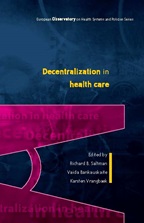
Governance
Taking bad decisions or implementing good ones badly, happens all too often in health policy and hampers progress towards resilient and sustainable health systems. This page showcases some of the European Observatory's work on this important topic.
Governance is crucial for improving population health and the performance of health systems. Governance is defined as the way we make and implement collective decisions. But experience shows that this is harder than it sounds. All too often, the governance goes wrong: bad decisions are taken, or good ones are badly implemented. Governance that has gone wrong eventually undermines population health and the performance of health systems. Bad governance is also a source of frustration for policy-makers, health professionals, patients and citizens.
One of the key reasons why governance so often goes wrong is misalignment between decision-makers and implementers; and there are many decision-makers and implementers in health systems. Health policy-makers decide policy on behalf of the electorate, sickness funds contract in line with government policy, and providers deliver according to payers’ requirements and patients’ expectation. In this, admittedly simplified, chain of decision-makers and implementers, lies the inherent danger that implementing organizations will follow their own organizational interests and not the intentions of the decision-maker. On the other hand, decision-makers who do not factor in the needs of the implementers clearly provoke bad implementation.
Strengthening governance for health and health systems is therefore key for improved population health and health systems performance.
The European Observatory’s programme of work on governance covers many areas of health and health systems. It considers the evidence of concrete governance issues that are relevant to policy-makers:
- Improving intersectoral governance to advance the achievement of Sustainable Development Goals;
- Engaging with civil society for better policy-making, service delivery and governance;
- Resolving the conundrums of centralization/decentralization in health systems;
- European integration in health and health systems;
- TAPIC – a framework for analyzing health and health system governance.
Related publications
Health actors will not achieve their aims on Sustainable Development Goals unless they are able to change the narrative. Health in All Policies is a key...
Everything you always wanted to know about European Union health policies but were afraid to ask
View online What does the European Union mean for health? What can it mean for health? This comprehensively revised third edition answers these questions....
It's the governance, stupid!: TAPIC: a governance framework to strengthen decision making and implementation
This policy brief’s key messages are: governance is a broad and complex topic with many overlapping definitions, frameworks and recommendations,...
Civil society and health: contributions and potential
Civil society organizations (CSOs) can make a vital contribution to public health and health systems, but harnessing their potential is complex...

Governance is the systematic, patterned way in which decisions are made and implemented. The governance of a health system therefore shapes its ability...
Intersectoral governance for health in all policies: structures, actions and experiences
Many of the policies and programmes that affect health originate outside the health sector. Governments therefore need to address population health using...

Health systems governance in Europe: the role of EU law and policy
© Cambridge University Press 2010This publication is in copyright. Subject to statutory exception and to the provisions of relevant collective licensing...

Decentralization has become a popular management strategy in many European health care systems. The logic of decentralization is an intrinsically powerful...
Multimedia
Subscribe to our newsletter
Sign Up